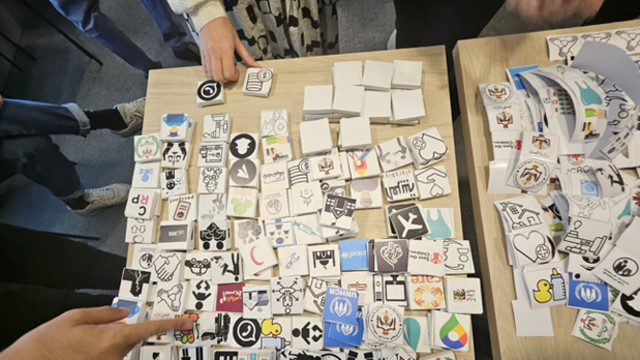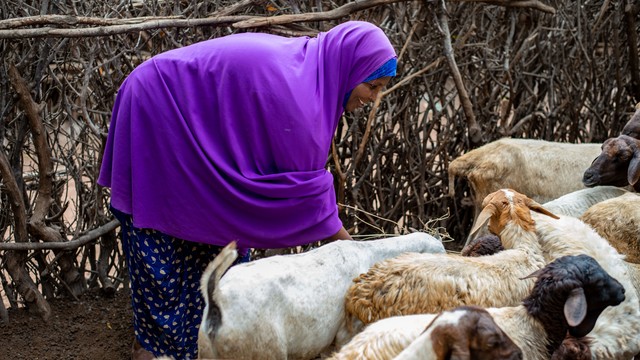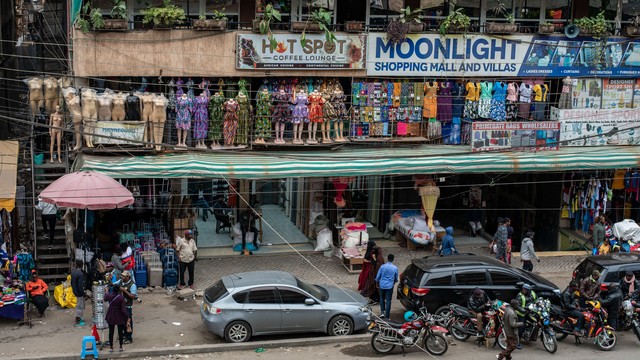In this war of words, no one is the victor
The Syrian crisis has been described as the worst humanitarian emergency since the Second World War. It is time to put aside the semantics of migrants versus refugees, and face up to the human suffering as a global community.


A rubber boat carrying around 50 refugees arrives from Bodrum, Turkey to the Greek island of Kos (Photo: Christopher Jahn/IFRC, CC BY-NC-ND 2.0)
No one can fail to have been moved this week by the heartbreaking images of three-year-old Aylan Kurdi, who drowned along with his mother Rehan and his five-year-old brother Ghalib, on the shores of Turkey.
Or last month the harrowing news that a lorry with 71 dead had been abandoned on a motorway in Austria. Or by the increasing number of unacceptable drownings as desperate people knowingly undertake what may the last journey of their lives, crossing the Mediterranean in unsafe vessels.
More than 300,000 people have used the dangerous sea route across the Mediterranean so far this year, with almost 200,000 of them landing in Greece and a further 110,000 in Italy.
According to the International Organization for Migration, more than 2,600 have drowned in the Mediterranean this year, trying to reach Europe's shores.
Action, not words
The fact that people are making these terrifying passages in order to escape worse fates in their homelands, often at the cost of thousands of pounds, should really inform the level of public debate around what has been termed repeatedly as a "migrant crisis".
And yet, this seems to have largely been a war of words, at a time when action is what is so desperately needed.
Vast numbers of those making the hazardous Mediterranean crossings are from Syria. There is no room in the debate for whether these people are refugees. That is why the UN refugee agency (UNHCR) has been intervening in the Syrian crisis for years now. They would be legally unable to act if these were migrants.
What we are witnessing in Europe is just a shadow of what the countries immediately surrounding Syria have seen. Lebanon, Jordan and Turkey have been shouldering the immediate flow of Syrian refugees on behalf of the international community for some time.
Lebanon has seen its population of four million grow by 25 per cent with the addition of around one million refugees.
The UNHCR says this is the worst humanitarian crisis since the Second World War, with the world facing its highest levels of population displacement – an issue which will not change without a serious concerted effort from the global community.
That it has been allowed to get to this point is shocking, but perhaps our collective use of language is to blame. The media still broadly refers to refugees as migrants even as people across Europe react to recent images with an outpouring of offers of private homes for resettlement, citizen-led drives to get aid packages to Calais, and petitions calling on our politicians to respond to this crisis with vision and leadership.
Honouring human rights
Al Jazeera has made a conscious editorial decision to refer to these displaced people as refugees, with the assumption that to term them as migrants is belittling to their experience and suggests they perhaps had some choice in their situation. Getting the terminology correct is a simple matter of honouring human rights.
In identifying the European Union crisis as a predominantly humanitarian event, we however need to recognise that migration is a normal human activity bringing many development, cultural and economic benefits. In itself, to be a migrant is not 'bad' and should not be demonised in the way we have seen from certain politicians referring to refugees as "hordes of marauding migrants" or worse.
The UK government's response has been to announce it will provide resettlement for "thousands" more refugees currently in displaced people camps in the region, in addition to the £900m in British aid given to Syria, including food, aid and medical supplies in neighbouring countries.
The exact number is to be announced next week, although Scottish First Minister Nicola Sturgeon is calling for a higher figure, saying that Scotland will welcome 1,000 refugees "as a starting point". Prime Minister David Cameron has also announced that a further £100 million will go to support Syrian aid efforts.
To provide some context on what the overall asylum intake looked like in developed countries in 2014, Germany had an estimated 173,100 asylum applications, closely followed by the US with 121,200, then Turkey (87,800), Sweden (75,100), and Italy (63,700). The UK had just 31,300 new asylum applications.
A coordinated approach
United Nations High Commissioner for Refugees Antonio Guterres has called on EU and industrialised countries to work together to find a lasting solution to the crisis. The agency have repeatedly stated that the immediately-hit countries (Jordan, Lebanon and Turkey) need help so they can offer better protection and infrastructure, which is what the UK is suggesting.
But the UK government can do more by pushing for a coordinated approach in providing proper legal avenues for resettlement and a consolidated approach to find a solution to the situation in Syria.
And it is vital that Europe ensures that the search and rescue operations in the Mediterranean are properly resourced. It is worrying that the agency responsible is still indicating that it lacks the resources it needs to do the job.
Next week the Conference of Presidents of the European Parliament will meet to discuss the refugee crisis on our borders.
2015 is a year for tackling the big development issues. This month the global community is about to sign up to the Sustainable Development Goals which suggest we adopt a universal approach to solving global problems. It would be a poor precursor to this historic agreement if Europe does not put forward some solutions in their discussions next week.
Furthermore, the relationship between climate change and mass movements of people is rarely simple. Environmental stress can be a factor in catalysing social and political collapse, but to put the emphasis there also risks letting those off the hook who should bear responsibility.
Given that such stresses are likely to grow dramatically, even under a 'best case' scenario, it would not be unreasonable to have concerns that our current actions are a frightening indicator of how we might choose to deal with future mass displacement of people.
The UK is an influential and wealthy country and our government has an opportunity to provide strong leadership on this issue both now and in the future. I hope we take it.
Andrew Norton (andrew.norton@iied.org) is director of IIED.



